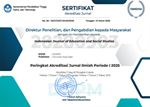Abdurahman, A., Ruhyadi, S. G. S. A., & Binasdevi, M. (2022). Implementasi Model Project Based Learning (PJBL) dalam Penerapan Kurikulum Merdeka Belajar di Kelas Tinggi MI/SD. Al-Ibanah, 7(2).
Abu Yasid Albustomi, & Hefniy. (2024). Optimizing Alumnus Contributions in Public Relations Management: A Study on P4NJ’s Role. Managere: Indonesian Journal of Educational Management, 6(3), 382–394. https://doi.org/10.52627/managere.v6i3.698
Adhinugraha, R. B. A., Hardhienata, S., Sunaryo, W., & Rozi, M. F. (2024). Transformative Strategies to Enhance Teacher Innovativeness: Addressing Challenges Through Strengthening Organizational Culture, Transformational Leadership, Self-Efficacy, and Achievement Motivation. Managere: Indonesian Journal of Educational Management, 6(2), 219–232. https://doi.org/10.52627/managere.v6i2.520
Ahmad Fauzi, Sanjani, M. A. F., & Lateh, M. (2025). The Influence of Social Media on Public Relations as a Reinforcement of Higher Education Reputation. Managere: Indonesian Journal of Educational Management, 7(1), 91–101. https://doi.org/10.52627/managere.v7i1.650
Al Mursyidin, R. A., & A’lal Hikam, M. (2024). Exploring the Effectiveness of Remedial Programs and Technology in Overcoming Learning Barriers in Secondary Education. International Journal of Instructional Technology, 3(2), 71–78. https://doi.org/10.33650/ijit.v3i2.11176
Amir, A., Wisudaningsih, E. T., & Hefniy, H. (2025). Teaching Load and Project-Based Learning: Unveiling the Effects on Teacher Performance and Compensation. Al-Tanzim: Jurnal Manajemen Pendidikan Islam, 9(1), 300–315. https://doi.org/10.33650/al-tanzim.v9i1.10342
Assidik, G. K. (2018). Implementasi Pembelajaran Berbasis Proyek (Project Based Learning) pada Mata Kuliah Media Pembelajaran di Prodi Pendidikan Bahasa Indonesia Universitas Muhammadiyah Surakarta. Transformatika: Jurnal Bahasa, Sastra, dan Pengajarannya, 2(2), 116–129.
Balaka, M. Y. (2022). Metode Penelitian Kuantitatif. Metodologi Penelitian Pendidikan Kualitatif, 1, 130.
Basri, H., Manshur, U., Baharun, H., & Suhermanto, S. (2024). Exploring Charismatic Leadership and Personality Competence: Keys to Fostering Teacher Motivation. Bidayatuna: Jurnal Pendidikan Guru Madrasah Ibtidaiyah, 7(2), 109–120. https://doi.org/10.54471/bidayatuna.v7i2.2983
Huberman, M. (1992). Analisis Data Kualitatif. Universitas Indonesia Press.
Husnol Khotimah, Manshur, U., Zaini, A. W., Sanjani, M. A. F., & Suhermanto, S. (2024). Increasing the Competence of Islamic Religious Education Teachers from a Madrasah-Based Management Perspective. Managere: Indonesian Journal of Educational Management, 6(1), 13–26. https://doi.org/10.52627/managere.v6i1.388
Afriana, J., Permanasari, A., & Fitriani, A. (2016). Penerapan Project Based Learning Terintegrasi STEM untuk Meningkatkan Literasi Sains Siswa Ditinjau dari Gender. Implementation Project Based Learning Integrated STEM to Improve Scientific Literacy Based on Gender, 2.
Kavlu, A. (2017). Implementation of Project Based Learning (PBL) in EFL (English as a Foreign Language) Classrooms in Fezalar Educational Institutions (Iraq). International Journal of Social Sciences & Educational Studies, 4(2), 67–79.
Arar, K., Sawalhi, R., & DeCuir, A. (2023). Islamic-Based Educational Leadership, Administration and Management: Challenging Expectations Through Global Critical Insights. First Published.
Lubis, L., Yuliani, B., & Nasution, F. (2020). Efektivitas Media Audio Visual dalam Meningkatan Kemampuan Salat Anak Usia Dini Autis di Raudhatul Atfhal Ar-Rahmah Kecamatan Medan Johor. Jurnal Diversita, 6(2), 270–276.
Maulidi, A. (2025a). The Effect of Emotional Intelligence and Self-Efficacy on the Sense of Dark Humor in Students of the Faculty of Psychology, State Islamic University of Maulana Malik Ibrahim Malang. Journal of Psychological Insight, 1(2), 92–105.
Maulidi, A. (2025b). The Influence of Emotional Quotient and Self-Efficacy on the Sense of Dark Humor in Students of the Faculty of Psychology. Journal of Psychological Insight, 1(1), 47–58.
Nadiyah, F., & Tirtoni, F. (2023). Pengaruh Project Based Learning terhadap Kemampuan Berpikir Kritis Siswa dalam Kurikulum Merdeka Belajar. VOX EDUKASI: Jurnal Ilmiah Ilmu Pendidikan, 14(1), 25–36.
Pratiwi, E. A., Zulhaji, Z., & Hajar, A. (2023). Penerapan Model Problem Based Learning (PBL) untuk Meningkatkan Keaktifan dan Hasil Belajar Siswa. Jurnal Pendidikan dan Profesi Keguruan, 2(2), 207. https://doi.org/10.59562/progresif.v2i2.30263
Putri, D. F. (2024). Human Resource Management (HRM) in Improving Customer Behavior Through Emotional Attachment (EA). Proceeding of International Conference on Education, Society and Humanity, 2(1), 850–859.
Putry, H. M. E., & Muassomah, M. (2021). TikTok Application as a Project-Based Arabic Learning Media. Alsinatuna, 6(2), 139–154.
Rahmawati, N. (2018). Pembelajaran Bahasa Arab: Menuju Higher Order Thinking Skills (HOTS). Prosiding Konferensi Nasional Bahasa Arab, 4(4), 149–154.
Romzy, M., Surbakti, A. H., Nurleli, Ramli, Fitriani, Hidayati, S., Andreas, Setiyono, Ansori, & Astuti, R. (2025). Manajemen Pengembangan Pembiayaan di Pendidikan Lembaga Islam. Yayasan Pendidikan Hidayatun Nihayah.
Sugiyono. (2017). Metode Penelitian Kuantitatif, Kualitatif, dan R&D. PT Alfabeta.
Supriatna, A., Musyadad, V. F., Syach, A., & Widiawati, D. (2021). Konsep Pendidikan Agama Islam Perspektif Pemikiran Syekh Ahmad Surkati. Edukatif: Jurnal Ilmu Pendidikan, 3(6), 4719–4730. https://doi.org/10.31004/edukatif.v3i6.1534
Syukriya, A. U. (2019). Implementasi PjBL dengan Media Instagram pada Keterampilan Menulis Bahasa Arab di SMA Islam PB Soedirman 1 Bekasi. Prosiding Konferensi Nasional Bahasa Arab, 5(5), 389–399.
Yulia Rahmi Ilmani, & Hasanah, U. (2024). Building Women’s Leadership in Education: The Key to Transformation for Lifetime Opportunities and a Success Mindset. Journal of Social Studies and Education, 2(1), 15–26. https://doi.org/10.61987/jsse.v2i1.641
 (Sekolah Tinggi Agama Islam Jarinabi)
(Sekolah Tinggi Agama Islam Jarinabi) 



